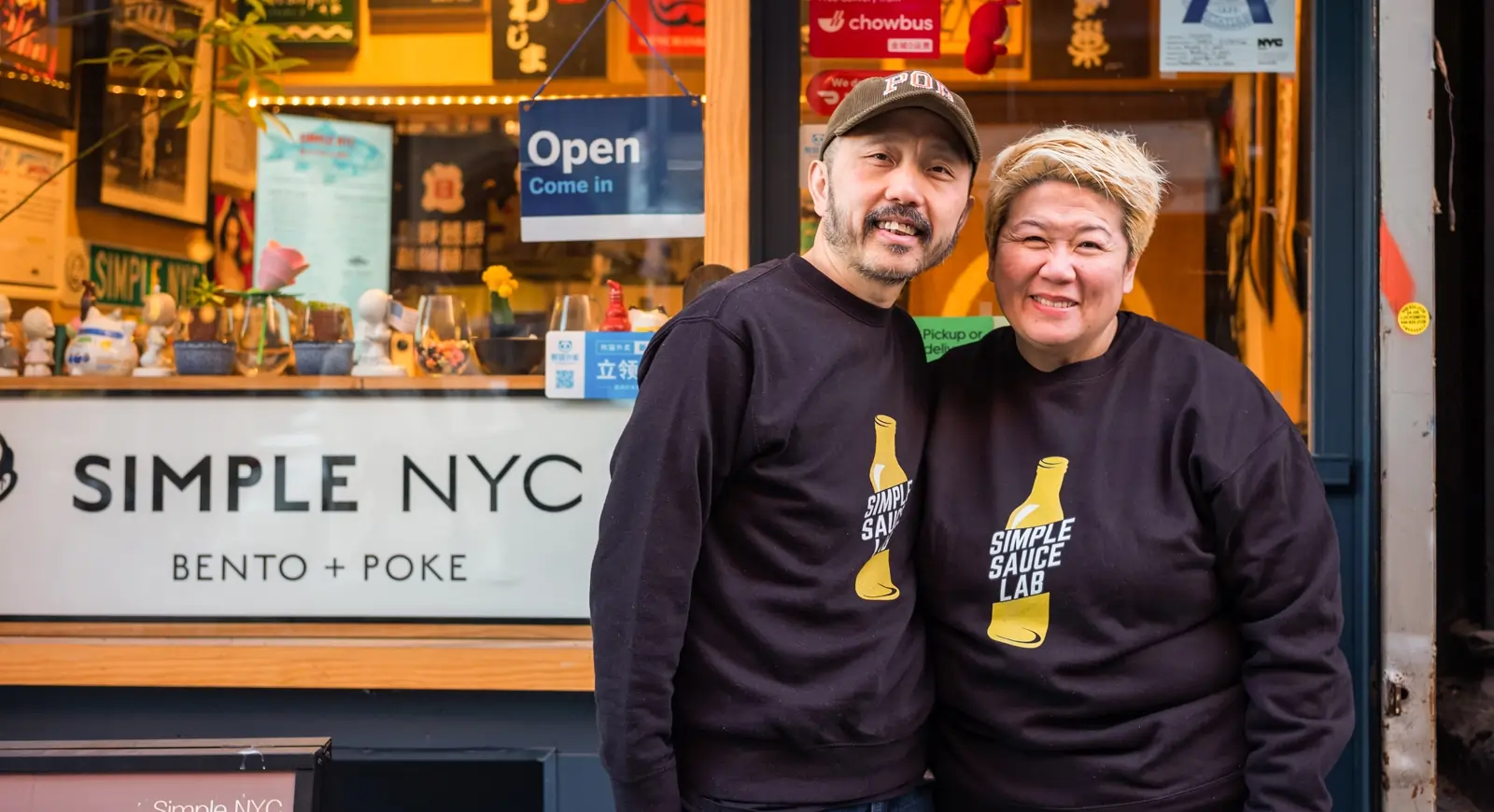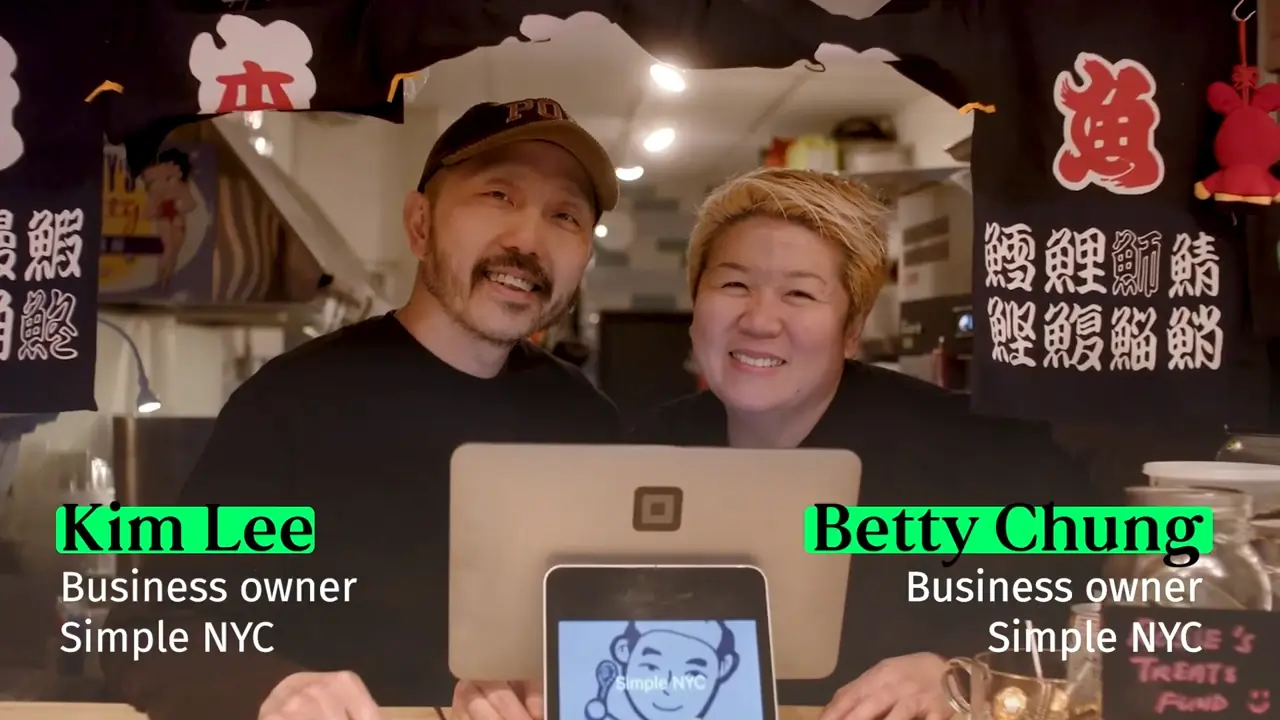Fresh ingredients and community focus help NYC Chinatown restaurant succeed

Key takeaways
- Support your community. Give help to people and neighborhoods facing challenging circumstances. This approach is good for the community and can drive success.
- Think like a customer. Focus on providing products and services that you would want as a customer, to keep company quality levels high and customer service competitive.
- Be prepared for the unexpected. Adopt a flexible mindset that requires a willingness to quickly make essential tactical and strategic adjustments as economic and market circumstances evolve. Line up financing to support key changes.

Chinatown Renewal Fund 2023 Recipient: Simple NYC
Video
Betty Chung and her husband, Chef Kim Lee, opened Simple NYC in Manhattan’s Chinatown neighborhood in 2016, capitalizing on the Hawaiian poke bowl trend. They provide a unique chef-inspired take on the popular bowls by adding homemade sauces to the dish of incredibly fresh raw fish, rice and vegetables. Using local ingredients and unique flavors, the couple hoped to create a restaurant that would serve the community with affordable, delicious and healthy food.
“We wanted our business to be sustainable long term and offer value to the neighborhood by providing food that would be nourishing for people and taste good,” says Chung. “Opening a successful small business in New York is very tough, and we didn’t just want to open yet another Chinese restaurant.”
The restaurant’s combination of locally sourced ingredients and artisan sauces inspired by Chef Kim’s 30 years of culinary experience led to a strong foundation. The couple’s restaurant has continued to thrive by focusing on providing the type of food they would want to eat at a restaurant and by supporting the community that has been so important to its success.
Simple NYC is a recipient of a $10,000 grant from the Citizens Chinatown Renewal Fund, a partnership with LISC NY, Asian Americans for Equality and Renaissance Economic Development Corporation. The program is designed to foster neighborhood resiliency and economic development in the wake of the significant impacts of COVID-19.
Chung shared insights from the couple’s experience launching and building Simple NYC. Read her tips here on how they adapted to the dynamic conditions of the past few years to position the business to be ready for success.
Tip: Think like a customer
Chef Kim’s culinary training enabled Simple NYC to consistently deliver unique flavors and food at the height of its freshness. Since the restaurant’s beginning, the couple has also been committed to offering food that is affordable and nutritious but is grounded in its customers’ ever-changing tastes and preferences.
“We love the food we cook — we wouldn’t serve anything to a customer that we wouldn’t give to our own family,” Chung says. “In any business, you need to think like a customer and consider if you would be happy with what you are selling. In our business, if something isn’t good enough for our kids or our parents, it will not leave our kitchen.”
Much of their confidence in their product comes from techniques that Chef Kim adopted in his 12 years as a chef creating Asian concept food for a company that operated restaurants in major airports around the globe. Fish for poke bowls is traditionally marinated with many different flavors, using a sauce that pickles the fish and keeps it fresh. If the sauce is left on too long, the texture of the fish changes. In order to elevate their poke’s flavor, Simple NYC adds the sauce as each order is fulfilled, using recipes Chef Kim creates with locally sourced ingredients.
“This way, we can ensure that the food is served at its peak, and the customer gets something unique they can’t find anywhere else,” Chung explains.
Bottom line
Keep the customer experience and preferences top of mind to keep your business focused on fulfilling market needs with the best possible product or service. Simple NYC continues to refine the restaurant experience to adapt to changing customer expectations, such as creating a new website and an improved social media experience to better inform customers of menu and ordering options as they evolve. It is also considering bringing Chef Kim’s signature sauces to a wider audience at retail.
"My husband’s recipes are great — we want to introduce them to the world and make them available to home cooks,” says Chung.
Tip: Support your community
Chung and Chef Kim live only a 10-minute walk from Simple NYC, so they intimately know the close-knit Chinatown community they serve. A central part of the restaurant’s mission is to give back to the community that has provided it with essential support.
“When the pandemic hit, we had dear friends and customers who gave us tremendous support. In addition to continuing to buy from us, they gave us encouragement, even if it was just a call or text to see how we were doing,” Chung says. “It helped so much to know that they had our back.”
Community support, for Chinatown residents and others, is at the heart of Simple NYC’s operations. When the city of New York reached out to Simple NYC with an opportunity to prepare fresh meals daily for Asian senior citizens stranded in Queens County, Chung and Chef Kim immediately agreed. As a company certified as a New York City Minority and Women-Owned Business Enterprise (M/WBE), Simple NYC was a perfect candidate for the contract.
Chung and Chef Kim knew it wouldn’t be an easy task, given supply chain and staffing shortages, but it took them only a moment to agree to the opportunity. The contract not only helped them support their business during lockdown but also gave them a chance to support Queens’ Asian community in addition to their Chinatown community.
Bottom line
When times are challenging, make it a priority to look out for others. This principal is good for your community and for business, Chung says, because the community notices what you do and how you give back. To stay the course even during tough times, the owners of Simple NYC try to be grateful every day for what they have. “It is important to remember that there are always people who have less than you do,” Chung says.
Tip: Be prepared for the unexpected
Operating a successful restaurant has always been challenging, and the past few years have been particularly difficult. Chung and Chef Kim have survived and flourished through their willingness to evolve and adapt.
Restaurants everywhere were hit hard by the pandemic lockdowns. Simple NYC reopened in November 2020 with many changes. Indoor dining at a communal table became a thing of the past, and the business increased its reliance on takeout and third-party delivery platforms. The food pickup area was reimagined, with barricades and plastic barriers to protect both customers and staff members; and the restaurant invested in protective gear and additional sanitation measures.
“We initially thought things would get back to normal quickly,” Chung says. “Little did we know that the effects would span over years, as the Chinatown community continues to be cautious about health measures.”
Staffing and retention issues have also reshaped how Simple NYC operates. Chung and Chef Kim have cut their team back to only one employee, since finding restaurant help in the post-pandemic environment has been challenging. The restaurant has also shortened its hours so the employee can safely commute home to Brooklyn; safety concerns have made many people reluctant to be out late at night in New York City.
What initially felt like a challenge has actually resulted in a strengthening of the company’s culture and resilience. Having a small staff means that everyone is cross-trained and ready to step into any role. “We’re like ‘The Three Musketeers,’” Chung says. “Each of us knows how to run both the front and the back of the restaurant, so we can all do whatever is needed.”
Once Simple NYC adjusted to pandemic conditions and circumstances improved, it was, like many companies, faced with the challenge of rising cost of goods. The cost of utilities, such as electricity, has more than doubled, and the price of ingredients has skyrocketed. For example, a case of eggs that once cost $30 is now $120.
To combat inflationary cost pressures, supply chain/food shortages and avoid continually passing price increases on to customers, Simple NYC looked to different suppliers and simplified its menu. “A smaller menu is easier to control from a supply perspective,” says Chung. “Having fewer items that we do very well cuts down on waste and helps us operate more efficiently.”
To support the restaurant’s essential investments and modifications, Chung and Chef Kim turned to government support options such as an Economic Injury Disaster Loan (EIDL) from the Small Business Administration, an emergency loan from Renaissance and its Citizens Chinatown Renewal Fund $10,000 grant.
Bottom line
Be flexible and ready to pivot when circumstances change, and modify your business to adapt to changing economic conditions, employee needs and consumer preferences. Monitoring changing conditions and adapting, even when you need to make tough choices, is essential to succeed. For many businesses, having financing in place can provide the support that’s required to make these changes. Consider all of your options, including grants, lines of credit, business loans and business credit cards, to weather tough times and seize important opportunities as economic circumstances evolve.
Related topics
Drone business finds a niche to finally reach its goals
Production company takes on the challenges of business in New York City
Puzzle maker boosts art accessibility and diversity
© Citizens Financial Group, Inc. All rights reserved. Citizens Bank, N.A. Member FDIC
Disclaimer: The information contained herein is for informational purposes only as a service to the public and is not legal advice or a substitute for legal counsel. You should do your own research and/or contact your own legal or tax advisor for assistance with questions you may have on the information contained herein.
